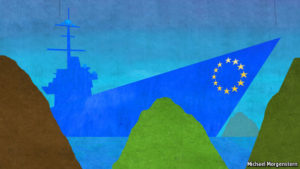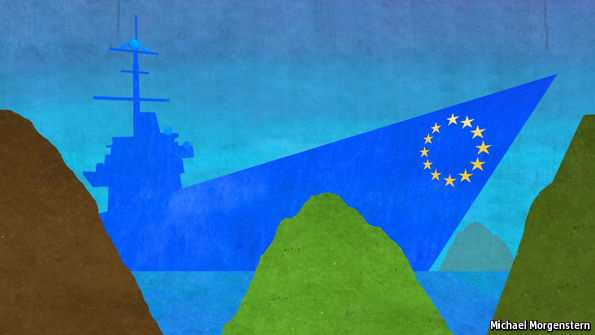WHEN American strategists role-play scenarios about a crisis with China—probably, these days, a flare-up in the South China Sea—they know they can rel

The EU itself sometimes displays a puppyish eagerness to have its military pretensions stroked: “Please, please, don’t just look at us as a big free-trade area,” pleaded Federica Mogherini, the EU’s high representative for foreign affairs, at the annual Shangri-La Dialogue in Singapore last year. She insisted that the EU is also “a foreign-policy community, a security and defence provider”. Its diplomats like to boast of the success of Operation Atalanta, in which, since 2008, an EU naval force has helped protect ships off the Horn of Africa from pirates.
So far that is a one-off. But at the Shangri-La Dialogue earlier this month, France’s defence minister, Jean-Yves Le Drian, suggested a European role in the region’s most pressing security worry: tension over China’s territorial expansion in the South China Sea. Mr Le Drian proposed that European navies “co-ordinate to ensure a presence that is as regular and visible as possible in the maritime areas in Asia”. So pleased was the minister with his idea that he intends shortly to explain it to his European colleagues. He would have been more convincing had he done this before unveiling it. If EU defence ministers cannot co-ordinate their statements, what hope for their navies? Many dismissed his proposal as an empty flourish that would soon be forgotten.
Cynicism about Europe is especially acute within ASEAN, the Association of South-East Asian Nations. It has a long history of bickering with the EU, first over Timor-Leste when it was under Indonesian rule, and then Myanmar under its former military junta. Former European colonies saw Europe’s preaching about human rights as hypocritical. More generally, Asians were irked that the Europeans appeared not to have grasped that their continent was in terminal decline. These perceptions have become even more entrenched as the EU has grappled with its internal agonies of economic distress, mass migration and the risk of Brexit. Europe, the story goes, is too preoccupied with its own woes to give thrusting, emerging Asia the attention and respect it deserves.
It does not help that the EU is excluded from the two ASEAN-centred groups that are establishing themselves as the most important forums for discussing security issues: the East Asia Summit and the cumbersomely named ASEAN Defence Ministers’ Meeting Plus. Besides the ten ASEAN members, these include eight other countries, among them America, China, India, Japan and Russia, but not the EU. It is a Catch-22: the EU is not deemed sufficiently engaged in Asian security to qualify for membership; yet without it, contributing to the debate is difficult.
Asian EU-doubters point out that the tiny military presence in Asia is anyway not in the EU’s name but in that of two member-states: France, which has 8,000 security personnel in the region to protect its territories in the Indian and Pacific oceans; and Britain, which maintains a Gurkha garrison in Brunei and some residual facilities in Singapore. The other European defence minister to speak at Shangri-La this year, Britain’s Michael Fallon, did not mention the EU’s security role in Asia, stressing instead the hope that it would “flex its financial, diplomatic and legal muscles, as it has been doing with Russia”. He also spoke of Britain’s pride in belonging to “the only formal multilateral defence arrangement in South-East Asia”, the Five Power Defence Arrangements linking it with Malaysia, Singapore, Australia and New Zealand—a legacy of Britain’s hasty withdrawal from “East of Suez” nearly half a century ago.
That points to another Asian complaint: that the EU is divided and cannot speak with one voice. ASEAN diplomats, for example, joke that Britain, in its determination to become China’s “best friend in Europe”, might thwart EU consensus at China’s behest, just as small countries such as Laos and Cambodia sometimes do in ASEAN. This week, for example, ASEAN scrambled to retract a statement by its foreign ministers that implicitly criticised China’s maritime expansionism. Similarly, some European officials worry that Chinese cash and favours to some of the EU’s eastern members in particular may make those stiff statements a little more flaccid in future.
China will seek to lure the EU as a whole away from following America’s China policies; and, as it does with ASEAN, it will seek to exploit internal tensions. A new paper by the International Institute for Strategic Studies, the London-based think-tank that organises the Shangri-La Dialogue, calls this “negative strategic spillover” from competition between EU members for China’s commercial favour.
None of this, however, seems a good reason either to exclude the EU from the forums where Asian security is discussed, or to react unenthusiastically when Europeans do suggest greater involvement. A European military presence in the South China Sea would show that what is at stake there is not just a competition between America and China: it is the future of a rules-based global system. Europeans, so used to talk of their sliding global standing, and so befuddled by their internal troubles, tend to forget that Asia needs them as much as they need Asia.
Font: The Economist

